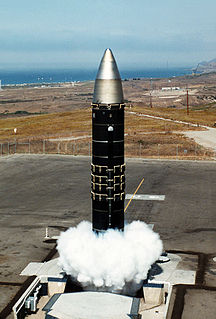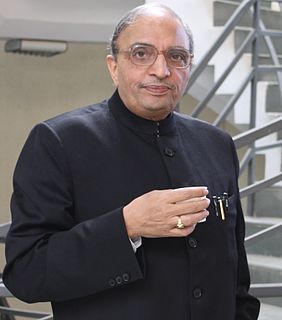
An intercontinental ballistic missile (ICBM) is a ballistic missile with a minimum range of 5,000 kilometres (3,100 mi) primarily designed for nuclear weapons delivery. Conventional, chemical, and biological weapons can also be delivered with varying effectiveness, but have never been deployed on ICBMs. Most modern designs support multiple independently targetable reentry vehicles (MIRVs), allowing a single missile to carry several warheads, each of which can strike a different target. Russia, the United States, China, France, India, the United Kingdom, and North Korea are the only countries known to have operational ICBMs; Israel is believed to possess them as well.

The National Guard is a state-based military force that becomes part of the reserve components of the United States Army and the United States Air Force when activated for federal missions. It is a military reserve force composed of National Guard military members or units of each state and the territories of Guam, the Virgin Islands, Puerto Rico, and the District of Columbia, for a total of 54 separate organizations. It is officially created under Congress's Article 1 Section 8 ability to 'raise and support armies'. All members of the National Guard are also members of the organized militia of the United States as defined by 10 U.S.C. § 246. National Guard units are under the dual control of the state governments and the federal government.

Belgium is a country in Europe and member of major international organizations like the European Union and NATO which are both headquartered in Brussels, Belgium.

Peacekeeping comprises activities intended to create conditions that favour lasting peace. Research generally finds that peacekeeping reduces civilian and battlefield deaths, as well as reduces the risk of renewed warfare.

The LGM-118 Peacekeeper, originally known as the MX for "Missile, Experimental", was a MIRV-capable intercontinental ballistic missile (ICBM) produced and deployed by the United States from 1985 to 2005. The missile could carry up to 12 Mk.21 reentry vehicles, each armed with a 300-kiloton W87 warhead. Initial plans called for building and deploying 100 MX ICBMs, but budgetary concerns eliminated the final procurement; only 50 entered service. Disarmament treaties signed after the Peacekeeper's development led to its withdrawal from service in 2005.
Quality function deployment (QFD) a method developed in Japan beginning in 1966 to help transform the voice of the customer into engineering characteristics for a product. Yoji Akao, the original developer, described QFD as a "method to transform qualitative user demands into quantitative parameters, to deploy the functions forming quality, and to deploy methods for achieving the design quality into subsystems and component parts, and ultimately to specific elements of the manufacturing process." The author combined his work in quality assurance and quality control points with function deployment used in value engineering.

Terminal High Altitude Area Defense (THAAD), formerly Theater High Altitude Area Defense, is an American anti-ballistic missile defense system designed to shoot down short-, medium-, and intermediate-range ballistic missiles in their terminal phase by intercepting with a hit-to-kill approach. THAAD was developed after the experience of Iraq's Scud missile attacks during the Gulf War in 1991. The THAAD interceptor carries no warhead, but relies on its kinetic energy of impact to destroy the incoming missile.
Software deployment is all of the activities that make a software system available for use.
In software engineering, continuous integration (CI) is the practice of merging all developers' working copies to a shared mainline several times a day. Grady Booch first proposed the term CI in his 1991 method, although he did not advocate integrating several times a day. Extreme programming (XP) adopted the concept of CI and did advocate integrating more than once per day – perhaps as many as tens of times per day.

The Intergovernmental Authority on Development (IGAD) is an eight-country trade bloc in Africa. It includes governments from the Horn of Africa, Nile Valley and the African Great Lakes. It is headquartered in Djibouti City.

The African Standby Force (ASF) is an international, continental African, and multidisciplinary peacekeeping force with military, police and civilian contingents that acts under the direction of the African Union. The ASF is to be deployed in times of crisis in Africa. Addis Ababa, Ethiopia, serves as the Force's Headquarters. Douala, Cameroon, was selected in 2011 as the site of the AU's Continental Logistics Base (LOGBASE).
The Office of Energy Efficiency and Renewable Energy (EERE) is an office within the United States Department of Energy. Formed from other energy agencies after the 1973 energy crisis, EERE is led by the Assistant Secretary of Energy Efficiency and Renewable Energy, who is appointed by the President of the United States and confirmed by the U.S. Senate. Kelly Speakes-Backman was appointed Acting Assistant Secretary in January 2021.

The Ministry of New and Renewable Energy (MNRE) is a ministry of the Government of India, headed by current Union Cabinet Minister Raj Kumar Singh, that is mainly responsible for research and development, intellectual property protection, and international cooperation, promotion, and coordination in renewable energy sources such as wind power, small hydro, biogas, and solar power.
Platform as a service (PaaS) or application platform as a service (aPaaS) or platform-based service is a category of cloud computing services that allows customers to provision, instantiate, run, and manage a modular bundle comprising a computing platform and one or more applications, without the complexity of building and maintaining the infrastructure typically associated with developing and launching the application(s); and to allow developers to create, develop, and package such software bundles.

Iron Dome is a mobile all-weather air defense system developed by Rafael Advanced Defense Systems and Israel Aerospace Industries. The system is designed to intercept and destroy short-range rockets and artillery shells fired from distances of 4 kilometres (2.5 mi) to 70 kilometres (43 mi) away and whose trajectory would take them to an Israeli populated area. From 2011 to 2021, the United States contributed a total of US$ 1.6 billion to the Iron Dome defense system, with another US$ 1 billion approved by the US Congress in 2022.
DevOps is a set of practices that combines software development (Dev) and IT operations (Ops). It aims to shorten the systems development life cycle and provide continuous delivery with high software quality. DevOps is complementary with Agile software development; several DevOps aspects came from the Agile methodology.

Kanban is a lean method to manage and improve work across human systems. This approach aims to manage work by balancing demands with available capacity, and by improving the handling of system-level bottlenecks.
The term Smart Grid describes a next-generation electric power system that is classified by the increased use of communication and information technology in the generation, delivery, and consumption of electrical energy. For individual consumers, smart grid technology offers more control over electricity consumption. Typically, the goal is greater overall energy efficiency.

Deepak B. Phatak, is an Indian computer scientist and academic, and a recipient of the Padma Shri Award for his contribution in science and technology in 2013. He is known for his notable work for upgrading Aakash, advertised by its manufacturer as the 'world's cheapest tablet'. In 2009, he was ranked one of the 50 most powerful people in India.
Kubernetes is an open-source container orchestration system for automating software deployment, scaling, and management. Google originally designed Kubernetes, but the Cloud Native Computing Foundation now maintains the project.











